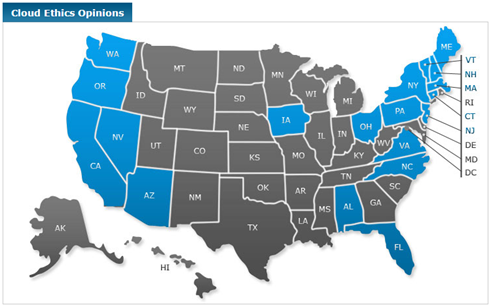Less Than Half the States Still Have an Ethics Opinion Regarding Lawyer Cloud Usage: eDiscovery Best Practices

From time to time, we like to take a look back at stories we’ve covered in the past and provide an update. About a year and a half ago, we published a blog post regarding the states that have published ethics opinions for lawyers regarding using and storing client data in the cloud. At that time, only 14 states (less than one third) had published an ethics opinion regarding lawyer cloud usage. Eighteen months later, only a few more states have done so.
The Legal Technology Resource Center (LTRC) of the American Bar Association’s (ABA) web site has a page titled Cloud Ethics Opinions Around the U.S., where the ABA provides an interactive map of the states (see the image of it above), with the states that have published ethics opinions shown in blue. Oddly enough, Wisconsin is not shown in blue, though they appear to have published an ethics opinion earlier this year. On the actual site, you can either click on the state to scroll down to it or manually scroll down to the state by name alphabetically (the list still has “Nevada” after “New Hampshire”, “New Jersey” and “New York” for some reason). Anyway, according to the ABA, here are the states that have published ethics opinions – with links to each state’s opinion (note that several of the links on the ABA site are not working, so we found the correct links and are providing them below):
- Alabama
- Arizona
- California
- Connecticut (Informal Opinion)
- Florida
- Iowa
- Maine
- Massachusetts
- New Hampshire
- New Jersey
- New York
- Nevada
- North Carolina
- Ohio (Informal Advisory Opinion)
- Oregon
- Pennsylvania
- Vermont
- Virginia
- Washington
- Wisconsin
If you counted, we’re up to 20 total states with opinions – less than 40% of the total state jurisdictions (when you include DC).
As noted previously, the ABA site provides two tabs below the interactive map to highlight the opinions:
- Quick Reference tab that identifies whether cloud usage for client data is permitted (so far, all states say “Yes”), the standard for use (currently all states with opinions enforce a reasonable care standard) and a bullet point list of specific requirements or recommendations;
- Opinion Summaries tab that provides a brief summary for each of the opinions.
Hopefully, the next time we check, a majority of the states will have published their own opinions by then.
So, what do you think? Are you surprised that more states don’t have published cloud ethics opinions? Please share any comments you might have or if you’d like to know more about a particular topic.
Disclaimer: The views represented herein are exclusively the views of the author, and do not necessarily represent the views held by CloudNine. eDiscovery Daily is made available by CloudNine solely for educational purposes to provide general information about general eDiscovery principles and not to provide specific legal advice applicable to any particular circumstance. eDiscovery Daily should not be used as a substitute for competent legal advice from a lawyer you have retained and who has agreed to represent you.









